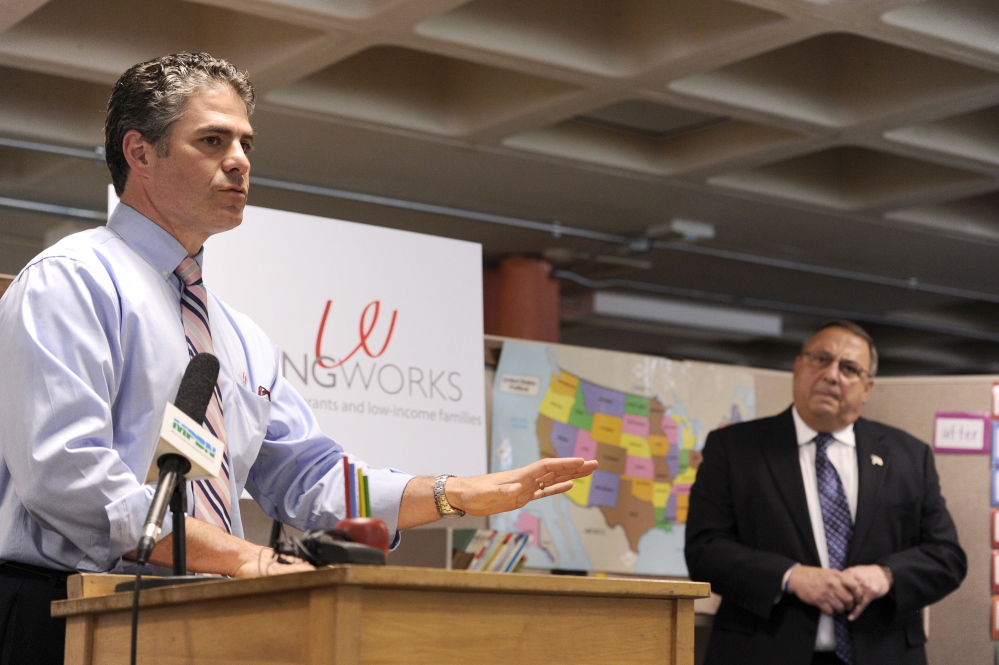Gov. Paul LePage visited Reiche Elementary School in Portland’s West End on Friday to announce that 32 Maine schools will benefit from an $11.3 million federal grant that supports after-school and summer learning opportunities for low-income and immigrant students.
LePage, who talked about his own upbringing as an at-risk student many years ago in Lewiston, said he overcame poverty and language barriers to succeed and he thinks every Maine student deserves the same opportunity.
Joining LePage were Maine Education Commissioner Jim Rier, Portland schools Superintendent Emmanuel Caulk, South Portland schools Superintendent Suzanne Godin and Ethan Strimling, CEO of LearningWorks, the Portland-based nonprofit that will receive $2.5 million of the funding under the 21st Century Learning Centers program.
LearningWorks will use the money over a period of five years to provide extended learning time to more than 300 students at four schools in Portland, including Reiche, and two schools in South Portland.
In addition to LearningWorks, 14 other learning centers representing 26 additional schools across Maine will receive funding under the latest grant cycle. That brings the total number of sites to 59, according to Rier.
“Assumptions are often made about what students can or cannot accomplish because of their family’s income, native language or other circumstances,” Rier said in a statement. “Yet across the state, schools are helping their students find success in the classroom and the community by using different approaches to overcome those challenges rather than excuse them.”
The federal 21st Century Learning Centers program has been around since 1998 but didn’t really take off until 2002, when the federal law known as No Child Left Behind was passed. Funding nationally has increased from $40 million in the first year to $1.15 billion in 2014.
Strimling, a Democrat who admitted during Friday’s event that he doesn’t always agree with the Republican governor, said the grant program is a way for the two sides to merge their competing ideologies.
“If you’re willing to pull yourself up, we’ll provide the community to help you succeed,” he said.
Maine’s 15 grant recipients were selected by the state Department of Education through a competitive bid process. The Learning Centers will receive a set amount for the first three years, then 75 percent of the original award amount in the fourth year and 65 percent in the fifth year.
In addition to Portland, schools in Bangor, Lewiston, Auburn, Sanford and other areas received funding ranging from $75,000 to $300,000.
The goal of the program is to assist students who have fallen behind by offering after-school and summer opportunities, with the hope that they can catch up by the next school year. In addition to improving academics, the grants will assist students with health and wellness, drug and violence prevention and career preparedness, according to the Department of Education.
A number of the students who will benefit from the program, particularly in the Portland area, are children of immigrants. Strimling was asked by a reporter Friday if he knew how many of those children might be undocumented immigrants. Strimling said he didn’t know.
The governor then weighed in.
“If we do have them (illegal immigrants), they are not qualified,” LePage said. “You need to have legitimate paperwork.”
His comments echoed what he has been saying for the past two weeks about General Assistance. LePage and Health and Human Services Commissioner Mary Mayhew announced this month a shift in state policy that undocumented immigrants would no longer be eligible for assistance. LePage then took that one step further by indicating that he would withhold state funds to any municipality that provided such assistance.
Maine Attorney General Janet Mills has challenged the constitutionality of LePage’s shift in policy.
Send questions/comments to the editors.




Comments are no longer available on this story